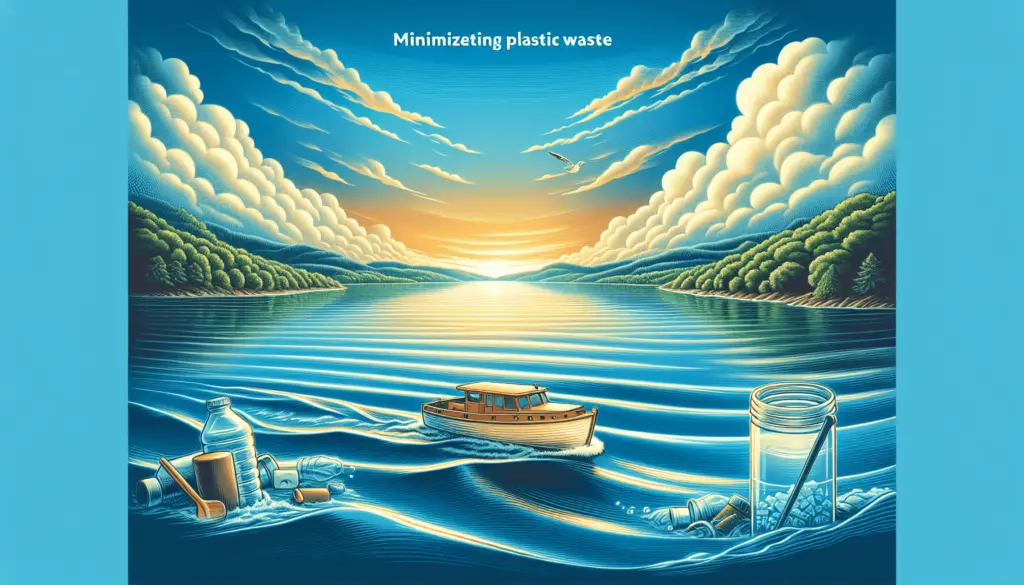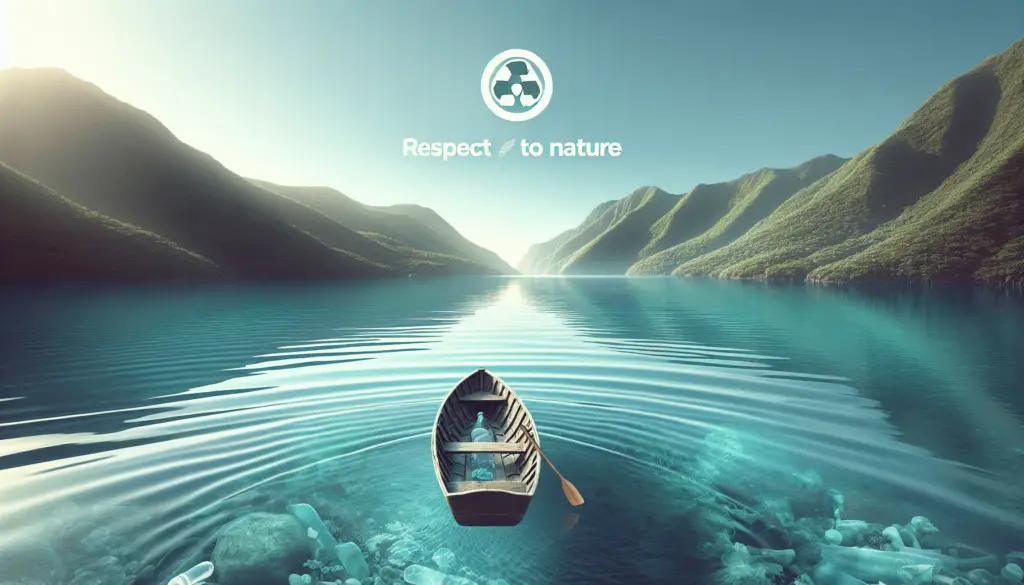Ready to enjoy your leisure time on the water without contributing to the alarming rise in plastic waste? Read on! “Minimizing Plastic Waste While Boating” offers you simple yet effective strategies to reduce your ecological impact during your boating adventures. You’ll discover how to swap single-use plastics for sustainable alternatives, reducing not only your waste but also your guilt as you enjoy nature. Strap on your life vest, mindful mariners – it’s smoother sailing ahead for you and our blue planet.
Understanding the Impact of Plastic Waste in the Marine Environment
Let’s get started by understanding the severity of the global problem that is plastic waste into our oceans. It’s regular for humans to throw away a staggering amount of plastic each year which sadly, a substantial portion of it ends up in our oceans. This disaster is not just tarnishing the beauty of our blue planet but also posing severe threats to the marine ecosystem and human health.
Highlight the global problem posed by plastic waste
You may have heard alarming facts and figures about the weight of plastic in our oceans being projected to outweigh fish by 2050. Now that’s a concerning aspect! From single-use plastic straws to plastic packaging, almost every waste item you could think of, has already found its way into our oceans. It’s not only a ticking time bomb for marine life, but it’s also an issue that could alter our planet’s health and wellbeing.
Impact on marine life
The impacts of plastic waste on marine life are devastating, to say the least. Be it sea turtles, dolphins, or seabirds, many marine animals often mistake fragments of plastic waste for food. Their ingestion not only leads to starvation and malnutrition but also causes fatal physical injuries. Further, creatures like barnacles and algae also hitch rides on floating plastics, spreading harmful species to foreign ecosystems.
Negative effects on food chain and human health
The ingestion of plastic by marine creatures has a snowball effect, creating a domino impact up the food chain, human health not being an exception. When plastics degrade, they break down into smaller particles known as microplastics. Small fish and other marine species often consume these harmful microplastics. Consequently, these creatures then pass the harmful substances up the food chain, even to humans who consume seafood.
Visual pollution and impact on tourism
Unquestionably, the sprawling patches of plastic waste floating on the water’s surface also poses a visual blight. The pristine image of turquoise waters and sandy shores is being replaced by plastic-ridden beaches and murky waters. The impact on tourism is significant given the role of natural beauty in drawing tourists. This visual pollution keeps the tourists away, thus affecting local economies.
Identifying Common Sources of Plastic Waste While Boating
Now that we understand the staggering impact of plastic waste, let’s address the elephant in the room, boating. Yes, boating happens to be a significant contributor to plastic marine debris.
Food packaging
Food packaging forms a massive part of the waste generated onboard a boat. Single-use plastic bags, wrappers, containers, and other disposables all contribute to the pile of waste that often ends up in our sea.
Beverage bottles
Another major guilty party is beverage bottles. Whether its water, soda, or alcohol, usually every drink bought on board comes in a single-use bottle that, more often than not, gets discarded into the ocean.
Fishing gear and equipment
Fishing gear like nets, lines, floats, and traps, often made of plastic, significantly contribute to marine debris. Fishing gear left behind or lost at sea forms what we call ‘ghost gear,’ which causes significant harm to marine life.
Maintenance materials
Additionally, maintenance materials like scrapers, paintbrushes, and tarps often contain plastic. Irresponsibly discarded, they can quickly add to the plastic waste in the marine environment.

Incorporating the Concept of ‘Reduce, Reuse, Recycle’ Onboard
It may seem daunting, but combating plastic waste while boating is entirely feasible. Adopting and incorporating the concept of ‘Reduce, Reuse, Recycle’ is already half the battle won.
Reduce buying and using plastic items
Reducing plastic starts with reevaluating our purchases. Opt for products with minimal or no plastic packaging. Encourage your yacht club or marina to stock eco-friendly items.
Reuse items as much as possible
Every product that gets given a second life, results in one less item thrown away. Be it refilling your water bottle or using fabric shopping bags; every single effort makes a difference.
Recycle plastic waste responsibly
Wherever you are, make responsible recycling a priority. It’s crucial to ensure that you correctly segregate your waste and dispose of it at proper recycling facilities.
Investing in Sustainable Alternatives to Plastic
Investing more in sustainable alternatives to plastic can help you be a part of the solution.
Usage of biodegradable material
Opt for paper or other biodegradable material in place of plastic. Nowadays, there are numerous alternatives available for everything from bags to containers.
Refillable water bottles and containers
Instead of buying single-use water bottles, invest in a sturdy refillable one. The same principle applies to food containers too.
Reusable kitchenware and utensils
Switch to using reusable kitchenware and utensils. This includes reusable cups, plates, and metal straws, significantly reducing waste and contributing to a healthier marine environment.

Adopting Waste-Free Habits on Deck
Well, creating a waste-free boating experience is all about developing responsible habits and sticking to them.
Packing and unpacking your items responsibly
Be mindful while packing for your boating trip. Try to group items to minimize packaging waste. Moreover, be responsible while unpacking your items as well, ensuring that you dispose of the wrappers correctly.
Planning meals and snacks to minimize packaging
Plan your on-board meals in ways to reduce the packaging required. Use reusable containers for food and snacks rather than one-use plastic alternatives.
Waste segregation and storage
Understanding waste segregation is key. Segregate biodegradable, non-biodegradable, and recyclable waste efficiently. Make sure that your boat has well-defined waste storage spaces to avoid accidental littering.
Advocating for Responsible Fishing Practices
It’s essential to promote responsible fishing practices to minimize the impact on the marine environment.
Usage of non-plastic fishing gear
Using non-plastic fishing gear like wood or metal traps, natural fiber nets can significantly reduce plastic waste. Make the switch!
Proper disposal and retrieval of nets and lines
Educate yourself and others around you about the proper disposal and retrieval of used nets and lines. Lost or abandoned fishing gear in the ocean can be harmful to marine species.
Implementing catch and release strategies
Implementing catch-and-release fishing strategies can help minimize the harm done to marine life. By using proper catch and release tactics, you can ensure that fish you do not plan to eat survive after being caught.
Maintaining an Eco-friendly Boat
An eco-friendly boat is more than just avoiding plastic. You need to think about the whole boat and the way it is maintained.
Using non-toxic cleaning products
Swap the toxic cleaning products on your boat for non-toxic alternatives. There are many marine-friendly products available that can clean your boat just as effectively.
Replacing plastic materials with sustainable alternatives
Be proactive and replace the plastic materials on your boat with more sustainable alternatives, like steel faucets or cloth sails.
Smarter fuel use strategies
Efficient use of fuel not only saves you money but also reduces your boat’s emissions. Going slow and steady, avoiding rapid acceleration and deceleration, and maintaining your engine correctly can significantly reduce your fuel consumption.
Participating in Clean Up Drives and Initiatives
Being part of clean-up drives and initiatives is an effective way to combat plastic pollution.
Joining coastal and underwater clean ups
Several organizations organize clean-ups to get rid of the waste accumulated on the coasts and underwater. Join in these efforts and make a difference.
Supporting organizations that advocate for clean oceans
You can also support organizations that advocate for clean oceans. They undertake various initiatives to combat the problem of marine plastic waste.
Informing fellow boaters about good practices
Spread knowledge and awareness by talking about the problem and the possible solutions to fellow boaters.
Applying for Green Boating Certifications and Accreditations
Having a green boating certification not only endorses your sustainable practices but also inspires others.
Understanding types of green certifications
Several types of green certifications are available, each having different criteria and benchmarks. Research to understand which one suits you best.
Benefits to business and reputation
Such certifications can boost your business and personal reputation among peers and customers, respectively. It shows your commitment to a cause that many people feel passionate about.
Process for application and renewal
Once you’ve decided on a certification, learn about its application and renewal process. Do keep in mind the standards you’ll have to maintain or exceed.
Educating Boaters and Guests about Plastic Waste Reduction
As a responsible boater, it’s your duty to educate others about plastic waste reduction.
Creating awareness about marine pollution
Share information and raise awareness about the threat of plastic waste to marine ecosystems. A little education can go a long way.
Involve them in waste management on board
Encourage your guests to be a part of the waste management efforts onboard. Show them how to sort waste and where it should be disposed of.
Inspiring them to adopt eco-friendly habits
Set good examples and be a source of inspiration for others to adopt eco-friendly habits. This can go a lot further in minimizing plastic waste while boating.
So there you have it, folks! By following these simple yet effective steps, you’re actively contributing to the preservation of our precious marine environment. Your boating adventures should not compromise the health of our oceans. So let’s tackle the plastic problem together and ensure that our waters remain clean and vibrant for generations to come!

